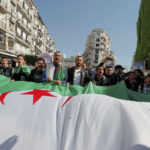Football fans, Algeria’s invisible catalyst
Protests against Algerian President Abdelaziz Bouteflika have been fanned by football followers, whose stadium chants have been heard across the country.
Author:
20 March 2019

After Friday prayers on 22 February, tens of thousands of mostly young men from the blue-collar neighbourhoods of The Casbah, Bab El Oued, 1er Mai and Belcourt marched towards downtown Algiers in protest against President Abdelaziz Bouteflika’s intention to run for a fifth term in the Algerian presidential elections scheduled to be held this year.
For half an hour, the crowd circled between the Grande Poste and Place Audin chanting, “[This is] a republic, not a monarchy”, “Peaceful, peaceful” and “These people do not want [Abdelaziz] Bouteflika and Saïd [Bouteflika, Abdelaziz’s brother]”.
Related article:
Since then, millions of Algerians have taken to the streets on subsequent Fridays. The peaceful and responsible nature of the protests has been correctly emphasised, as the overwhelming majority of protesters have used peaceful language, cleaned the streets towards the end of protests and refused to respond to the pepper spray and tear gas used by security forces.
However, a troubling string of police clashes has developed in the past few weeks.
As sunset falls and volunteers tie knots in their garbage bags, Algiers grows tense. Hundreds of young men attempt to trek 5km up the heights of Algiers towards a vacant presidential palace (Bouteflika had spent 17 days in Geneva, amplifying rumours of his poor health).
A police cordon holds steady before the human wave bypasses Telemly, an artsy-chic district that has borne the brunt of the clashes. Only here is animosity between the police and protesters tangible. At 5.30pm, police officers use Flash-Ball riot weapons to fire tear gas before charging at the protesters. Panic pushes the majority back, but several dozen remain to launch chunks of concrete at the riot police.
Within 15 minutes, the confrontation is over.
From their balconies, residents of Telemly reprimand members of the media who film the skirmish. On the ground, volunteer doctors confirm the ingestion of hallucinogens after treating the injured. The tension in the air dissipates and Algiers moves into cyberspace to review the day’s events.
Regime allegedly behind unruly rioters
On social media, theories are bandied about. Some say the regime paid the rioters to cause trouble and sully the image of the protests. That is not surprising, considering the distance mainstream society keeps vis-a-vis a certain subset of working-class Algerian men, in spite of them being responsible for creating a lot of mainstream Algerian culture.
For example, protests hit Algeria 31 years ago for the first time in the young country’s history. A sharp drop in oil prices and imposed austerity measures sparked violent protests, with public infrastructure being the main target. The building housing the Ministry of Youth and Sport was torched, as were public buses, bureaus and, most famously, the Monoprix in Bab El Oued.
The most prized commodity for looters were Adidas Stan Smith sneakers. That year, 22 million pairs were sold, earning them a place in the Guinness Book of World Records as the highest selling sneaker. For many young men, Stan Smiths represented a level of affluence and access to the world that was not available to them in the tougher districts of the capital. The shoes remain extremely popular in Algeria, even in 2019.
It was reported that so many pairs were looted in 1988 that some football supporters sang: “Whoever does not have Stan Smiths is not a man.”
According to Abdelkader Ensaad, who produced a seminal documentary on Algerian stadiums – Echos des Stades (Echos of Stadiums), the late 1980s is when young Algerian men began to see the stadium as a place where they could “recreate a world according to their desires”. A marginalised class will always find a way to carve out its own territory and, in Algeria, that space exists in football stadiums.
In a rapidly changing Algeria, where young men are outnumbered by their female counterparts in universities and the populist discourse claims women are hired more frequently for entry-level positions, the backlash is articulated in the stadium.
Songs addressing social issues
North African supporters are notoriously musical and their songs increasingly address social issues from the eyes of the young and excluded Algerian man. Yet, since mass protests have broken out, the same songs chanted in the stadium are now heard on the streets.
It can be argued that the first opposition to Bouteflika’s fifth term was voiced by football supporters. Football club USM Alger’s supporters group Ouled El Bahdja released a single titled La Casa Del Mouradia in April 2018, named after the popular Netflix series that depicts a hold-up at the Royal Mint of Spain.
In the first (term), they tricked us with “reconciliation”
In the second (term) their plan became clear: “La Casa Del Mouradia”
In the third (term), the country suffered due to personal interests
In the fourth (term), the puppet died and the problem remains
La Casa Del Mouradia has become an anthem of sorts at the protests, sung by tens of thousands from all walks of life.
Ouled El Bahdja were given the chance to voice their opposition late last week when authorities made the surprising decision to maintain the Derby of Algiers on 14 March between USM Alger and MC Alger.
The derby usually draws a minimum of 50 000 supporters at the Stade 5 Juillet, but this year saw a meagre turnout.

Derby boycott
On the evening of the match, cafes in the Upper Casbah were replete with USM Alger supporters, who suspected the regime of concocting some kind of plan.
“They have cancelled every match so far. Why are they playing this one? People are not stupid,” said one supporter.
“Uncle Ahmed”, a famous USM Alger supporter, confirmed that he would miss his first derby in a long time.
“Me, personally? I won’t go,” he muttered, shaking his head, before adding, “This isn’t the right time to go to the stadium. It is like when you give candy to a baby to pacify it. We will take care of the country first and then go to the stadium.”
Related article:
In Bab El Oued, two MC Alger ultra groups issued calls to boycott the match, sticking notices on street signs and publicising their calls on Facebook.
Be that as it may, 15 000 supporters showed up for the derby. The terraces drew more attention than the back-and-forth fixture playing out on the pitch. Both sets of supporters chanted against former prime minister Ahmed Ouyahia and Bouteflika for a significant portion of the 90 minutes.
Ouled El Bahdja were in particularly good form, singing Ultima Verba (Last Word), a political song loosely based on Victor Hugo’s poem of the same name. Algeria’s most famous young artist, Soolking, would sample the melody and release a No. 1 song titled Liberté (Freedom) soon after the derby.
The morning after the derby, 800 000 to 1 million people marched in Algiers. The tens of thousands that refused to attend the derby were in the streets, orchestrating resistance against Bouteflika’s regime and once more clashing with the police in Telemly.

Representation
Despite the significant influence this subset of society has had on Algerian culture, they continue to be underrepresented.
According to journalist Hamdi Baala, who has covered the protests from their inception: “If this movement is about representation, then this movement will not be 100% successful until everyone feels 100% represented.”
Bouteflika’s opaque regime has made multiple symbolic concessions since the protests broke out, including announcing that he will not run for a fifth term. For the majority, success would consist of the entire ruling elite stepping down.
Perhaps a more holistic and utopian metric for this Algerian movement will be a future country in which no citizen feels like they need to revolt or riot to be included.


